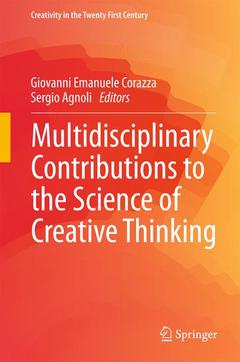Description
Multidisciplinary Contributions to the Science of Creative Thinking, 1st ed. 2016
Creativity in the Twenty First Century Series
Language: English
Subjects for Multidisciplinary Contributions to the Science of...:
Publication date: 08-2015
Support: Print on demand
Publication date: 10-2016
Support: Print on demand
Description
/li>Contents
/li>Biography
/li>Comment
/li>
Introduction.- On the Path towards the Science of Creative Thinking.- Theoretical Aspects of Creativity.- The Defragmentation of Creativity: Future Directions with an Emphasis on Educational Applications.- A Review of Integrated Approaches to the Study of Creativity: A proposal for a Systems Framework for Creativity.- Creative processes: Art, Design and Science.- Distributing creativity: Three thought experiments.- Social Aspects of Creativity.- Creativity and a human dichotomy: Individual or part of a team?.- Dangerous liaisons: bridging micro and macro levels in creativity research.- Chanel's Creative Trajectory in the Field of Fashion: The Optimal Network Structuration Strategy.- A Comparison of Creativity in Project Groups in Science and Engineering Education in Denmark and China.- Creativity in Design and Engineering.- Creativity in Engineering.- Creativity in Student Architects: Multivariate Approach.- Improving Self-Efficacy in Solving Inventive Problems in TRIZ.- Creating bio-inspired solution ideas using biological research articles.- Tele-Board MED: Supporting Creative Problem Solving in Behaviour Psychotherapy.- Creativity in the Arts.- Neurocognitive Aspects of Musical Improvisation and Performance.- Creativity and Art Education: Gaps between Theories and Practices.- Music Listening, Composition and Performance: An Experience of Creativity for Education.- Creating Music and Texts with Flow Machines.
Giovanni Emanuele Corazza, PhD in Telecommunications and Microelectronics Engineering, Full professor at UNIBO, department of DEI and Member of the Board of Directors of UNIBO. His research interests are in information society, creative thinking, creativity and innovation, wireless and satellite communications. In these fields, Giovanni E. Corazza has published more than 280 papers in international conferences and journals and he established collaborations with several research groups, universities and companies. Chairman of the Scientific Committee of the Fondazione Guglielmo Marconi, founder of the Marconi Institute for Creativity, member of the Editorial Board of Journal of Genius and Eminence. He is partner of the FP7 EU project CREAM, CReativity Enhancement through Advanced brain Mapping and stimulation.
Sergio Agnoli, received his Ms.C. in Psychology from the University of Padua in 2003 and a PhD in Developmental Psychology from the University of Ferrara in 2009. He is now a post-doctoral researcher at the University of Bologna – Marconi Institute for Creativity (MIC) and is involved in the FP7 EU project CREAM, Creativity Enhancement through Advanced brain Mapping and stimulation. He has held teaching appointments at the University of Padova, at the University of Ferrara and at the University of Bologna. His research interests include: cognitive and emotional substrates of creative thinking; creative thinking process; emotional development and emotional intelligence; psychophysiology of emotions. In these fields, Sergio Agnoli has published more than 50 contributions in peer reviewed international conferences and journals and he established collaborations with several research groups and universities.
Presents a multidisciplinary and multi-domain view of the most recent research findings on creative thinking
Provides platform for fruitful dialogue between disciplines that are typically divided by separating walls
Occupies an important position in the foundation of the science of creative thinking
Includes supplementary material: sn.pub/extras




